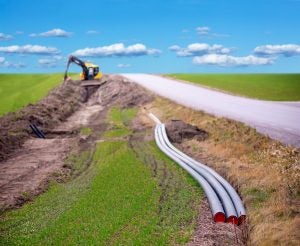We may not always be a fan of what the government is proposing to “better our lives,” but I am somewhat excited to see the implementation of Present Joe Biden’s broadband initiatives. Passed by lawmakers in November 2021 and signed into law then, the Infrastructure Investment and Jobs Act puts forth $65 billion to expand internet access the country.
Why does this matter to farmers and those living in rural areas? Like it or not, the internet is a major aspect in the daily lives of most people in the 21st century. Technology that is available to enrich our personal lives generally relies on the internet, but so does technology that can enrich our agricultural businesses.

New features on soil moisture sensors can control irrigation events — a vital service that helps reduce irrigation expenses and saves water — yet sending alerts directly to your phone may require internet access. Features to other technologies like drone sensors, equipment, storage monitoring, farm security, and many other important aspects of future farming will also require reliable internet services. These new developments will help farmers reduce expenses, utilize less pesticides, use fewer resources, potentially increase yields, and overall offer advancements to their operations. Many rural farmers have not been able to take full advantage of the current resources available to them due to lack of internet.
This has also affected those in rural communities that farmers are a part of. Education systems with vibrant internet may lack access to new teaching resources, while businesses may lack access to updated point of sale systems or inventory tracking. Every business likely has something they wish they could use but can’t due to lack of reliable internet service — or a lack of internet service completely.
I applaud the Biden administration’s efforts to enact one of the largest broadband deployments ever. I truly believe this will help serve communities in a way they have been seeking, without disrespecting their way of life or trying to turn them into the “big city.” Rural areas have been known to be a bit against change when it comes from the outside, but this is one that younger generations are likely going to be excited about and open to the new opportunities before them. Of course, we’ll have to see whether the implementation matches up with the proposal, but there is hope on the horizon.

Additionally, the Infrastructure Investment and Jobs Act doesn’t just support the efforts to expand broadband’s presence across the country, but it also hopes to make internet more affordable. Some of the country’s residents may have current access to internet, but it is not financially feasible for them to add another $100 or more in monthly bills. This barrier prevents them from accessing a key component of life in 2022 and beyond. The bill means that some households will be eligible to receive a $30 monthly stipend for internet.
Lastly, my favorite part of the potential of this bill is that it gives agriculture producers and ruralites an avenue to share their unique piece of the world through digital outlets like social media. Advocating for our way of life and agricultural industries is a great way to garner support from those who aren’t immersed in it every day.
Many farm owners are currently being wildly successful online and doing great things for agriculture education and awareness. I expect that many more will be added to the roster as internet access expands.
Michelle Miller, the Farm Babe, is a farmer, public speaker, and writer who has worked for years with row crops, beef cattle, and sheep. She believes education is key in bridging the gap between farmers and consumers.



